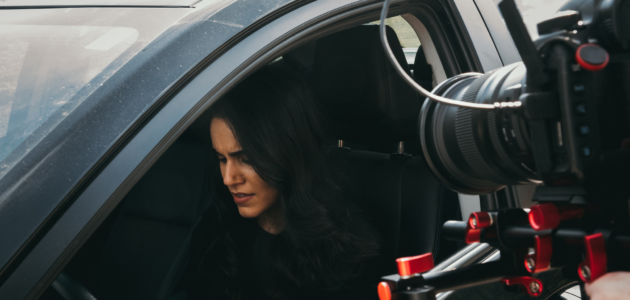
How to Act Natural
How hard can it be? You practice acting natural most of your life, so it should come – wait for it – naturally! But that elusive naturalism in your performance is a bit like breathing. Once you focus on it, it becomes more difficult and complex than when you didn’t have to think about it. The good news is that you can overcome this and get your extreme close ups looking vulnerable AF.
It’ll be easiest to cover this with another analogy. When you first learned how to write, it was not natural. Think of all the areas of disconnect that were involved. First, holding the pencil. Each finger at an angle, your grip using hidden muscles through your fingers, wrist, forearm, positioning your elbow while hunching your shoulder, trying to unhunch your shoulder while craning your neck – and the adorable tongue poking out the side in concentration. And you haven’t even begun to make the pencil put the marks down that you want it to. Fast forward to when picking up a pen has become so automatic that not only do you not think about the specifics like grip and posture, but you don’t think about forming the shape of each letter, or even each word. There’s a direct passage between the flow of your thoughts and the flow of ink. Poetry, prose, analytical observation, all spill onto the page naturally.
The analogy is relatively direct. You didn’t do handwriting lessons for your entire school life, but you did begin to study Language and Literature. So this concept of ‘acting naturally’ is your handwriting, and your acting as a craft is the language itself. Once you know how to write, you can use this tool to unlock an entire world of concepts and content to explore. If acting is a muscle that you need to consistently build, maintain, and flex throughout your entire career, naturalism is your gym membership. It is neither right or wrong, but simply one way to give you an opportunity to work.
Now that we’ve got our priorities straight, hopefully this tool of naturalism is a little less overwhelming. It is partly an organic process too, and having patience to bear faith in the process is half the battle. Consider that Geoffrey Rush studied clowning at Lecoq’s school and added this to his toolkit, but this doesn’t mean he only ever performs through clowning. It’s incorporated into his final performance because it has been incorporated into his toolkit.
As with many acting exercises, discovering naturalism in your acting is a process of repetition, analysis, correction, and repetition. Make your life easy by using a monologue from a Naturalism play. Strindberg is an excellent choice, maybe Chekhov if you’re feeling brave. This works even better if you have a scene partner, as real time feedback on your delivery is invaluable. Memorising this is not the objective, so script in hand is okay for beginners. Stay present with your delivery, take it slow and find truth in every action. Take it as slowly as you need. In this exercise, you are saying something very important to someone who loves you very much, and is patiently trying to understand not just what you are saying, but why you are saying it and what it means to you. They aren’t going to interrupt you, so take your time in conveying the purpose behind these words. Why these words and not other words? What motivates you to try to reach your scene partner, or monologue target? Did you choose these words through love, desperation, spite, chaotic rage? It’s a difficult metric of success to work with, but you can really feel the words landing when you have reached naturalism. It’s the difference between a phone call with a personal friend versus one with a receptionist.
Once you identify what natural acting feels like to you, don’t try to judge it or mould it. This will take you back to square one, to an artificial style. It’s more important to explore the wonders of the library than it is to write the perfect alphabet.

Leave a Reply